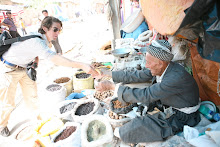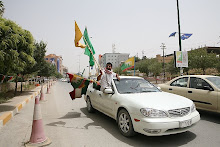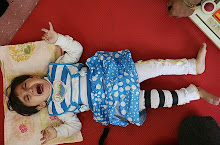My body has finally given in and I'm bedridden. I'm pretty sure it was the dubious looking meal the rappers prepared for me, but they were so pleased to offer it I couldn't say no.
This post will therefore remain short.
I last left you in Jeremie, a quiet town where I found little to do. It was beautiful but uninspiring. Old colonial streets and a charming cathedral were the highlights but the french were so busy in Haiti that these are found everywhere. At least people didn't snarl at you there the way they do in Port au Prince, and the city felt a little safer.
Hoping for something more remote I set off into the surrounding mountains in search of the home of Alexandre Dumas. (Snr). The family's plantation, L'habitiacion Madere, was near a small village called La Tiboliere, and although I knew it no longer existed I was curious to see where the family were from, the landscape that inspired them, and the conditions under which their slaves once worked. The ruins were apparently still intact so I was optimistic.
La Tiboliere is perched high in the hills. It has a population of a few thousand, but as most homes are spread deep into forest and it has only one dirt road, you could easily mistake it for a village of 10 families. The one solid structure is a large pink church with turrets that rise from the trees, and tower above the thick vegetation. It seems that every hamlet in this country has a grandiose church and it often dwarfs all around it. I can't help but feel that every religious denomination has tried at one point to 'save' the haitians, and that they have all sought to out-do each other. Catholics and protestants in particular have gone to battle over haitian souls, and there is bad blood between them. Mormons, latter day saints, baptists and buddhists have also given it a go, but none have removed the prevalence of voodooism.
My moped driver told me that he knew people who could put me up, and as anything would have been better than the moped ride down I spent the night in the hut of a lovely old woman. She hasn't seen many blancs before and did nothing but grin at me; we said barely a word to one other. Amazingly I slept soundly on her floor, my holland and holland bag once again doubling up as bedding. The mosquitos ate better than I did that night and breakfast was leftovers. I set off the next day having washed out of the family's communal bucket and still never having spoken a word to my host.
Someone had said they could lead me to L'habitacion Madere, but as so often happens here we merely walked in circles until he demanded money. The Haitians can be real bastards sometimes, and I want to strangle half of them.
I was close to the plantation, I knew that, and must certainly have trod in the footsteps of at least one Dumas, but much to my disappointment and despite walking for 3 hours I never saw anything resembling a house, or a memorial. Apparently there had once been one, but it was stolen - everything here has been used to patch up homes.
The landscape in the region was inhospitable, the air heavy, the heat unbearable. I can imagine a plantation being only slightly miserable if there are people to fan you, no strenuous labour and plenty of rum. Yet shackles, servitude and whips in this environment are beyond my comprehension. I rushed down to the airfield in time to catch my plane to Port au Prince. I needed movement, I needed change.
I call it a plane but it was more like a metal box with wings. I thought about how many times I had read about flights full of missionaries going down in far away lands, and then I counted the number of missionaries sitting around me. 5 out of 7 passengers. I hoped they were praying.
The pilot did little to settle my nerves. He was a spanish man who looked about 70. He wore 4 different pairs of sunglasses during the 30 minute flight, he had a towel round his neck like a ww2 ace, and told us to use telephones - "No hay problem". I wanted to know how he had ended up flying for tortug air in haiti, but he was smoking before the plane had stopped and an elderly canadian missionary was pestering me as we got off. She was convinced I was a boy scout and wanted to know where we had met and what chapter I belonged to. After telling her I was trying to earn my last badge here, I rushed into the terminal and back to the comparative sanity of Port au Prince.
I headed straight to the home of my rapper friend, had another impromptu freestyle, was goaded into walking to the end of the road and back and finding rum, and finally was fed something foul that made every sinew wretch. The next day I checked back into the Olofson and collapsed. I was in a dire state.
I remained like that for a couple of days with no sympathy from any of the staff. In fact they found it amusing - again - bastards!
I finally headed back south to Jacmel for a couple of days to finish some interviews. I'm here now and have been commissioned to write a piece for the Sun. I am finally an auteur!
This post will therefore remain short.
I last left you in Jeremie, a quiet town where I found little to do. It was beautiful but uninspiring. Old colonial streets and a charming cathedral were the highlights but the french were so busy in Haiti that these are found everywhere. At least people didn't snarl at you there the way they do in Port au Prince, and the city felt a little safer.
Hoping for something more remote I set off into the surrounding mountains in search of the home of Alexandre Dumas. (Snr). The family's plantation, L'habitiacion Madere, was near a small village called La Tiboliere, and although I knew it no longer existed I was curious to see where the family were from, the landscape that inspired them, and the conditions under which their slaves once worked. The ruins were apparently still intact so I was optimistic.
La Tiboliere is perched high in the hills. It has a population of a few thousand, but as most homes are spread deep into forest and it has only one dirt road, you could easily mistake it for a village of 10 families. The one solid structure is a large pink church with turrets that rise from the trees, and tower above the thick vegetation. It seems that every hamlet in this country has a grandiose church and it often dwarfs all around it. I can't help but feel that every religious denomination has tried at one point to 'save' the haitians, and that they have all sought to out-do each other. Catholics and protestants in particular have gone to battle over haitian souls, and there is bad blood between them. Mormons, latter day saints, baptists and buddhists have also given it a go, but none have removed the prevalence of voodooism.
My moped driver told me that he knew people who could put me up, and as anything would have been better than the moped ride down I spent the night in the hut of a lovely old woman. She hasn't seen many blancs before and did nothing but grin at me; we said barely a word to one other. Amazingly I slept soundly on her floor, my holland and holland bag once again doubling up as bedding. The mosquitos ate better than I did that night and breakfast was leftovers. I set off the next day having washed out of the family's communal bucket and still never having spoken a word to my host.
Someone had said they could lead me to L'habitacion Madere, but as so often happens here we merely walked in circles until he demanded money. The Haitians can be real bastards sometimes, and I want to strangle half of them.
I was close to the plantation, I knew that, and must certainly have trod in the footsteps of at least one Dumas, but much to my disappointment and despite walking for 3 hours I never saw anything resembling a house, or a memorial. Apparently there had once been one, but it was stolen - everything here has been used to patch up homes.
The landscape in the region was inhospitable, the air heavy, the heat unbearable. I can imagine a plantation being only slightly miserable if there are people to fan you, no strenuous labour and plenty of rum. Yet shackles, servitude and whips in this environment are beyond my comprehension. I rushed down to the airfield in time to catch my plane to Port au Prince. I needed movement, I needed change.
I call it a plane but it was more like a metal box with wings. I thought about how many times I had read about flights full of missionaries going down in far away lands, and then I counted the number of missionaries sitting around me. 5 out of 7 passengers. I hoped they were praying.
The pilot did little to settle my nerves. He was a spanish man who looked about 70. He wore 4 different pairs of sunglasses during the 30 minute flight, he had a towel round his neck like a ww2 ace, and told us to use telephones - "No hay problem". I wanted to know how he had ended up flying for tortug air in haiti, but he was smoking before the plane had stopped and an elderly canadian missionary was pestering me as we got off. She was convinced I was a boy scout and wanted to know where we had met and what chapter I belonged to. After telling her I was trying to earn my last badge here, I rushed into the terminal and back to the comparative sanity of Port au Prince.
I headed straight to the home of my rapper friend, had another impromptu freestyle, was goaded into walking to the end of the road and back and finding rum, and finally was fed something foul that made every sinew wretch. The next day I checked back into the Olofson and collapsed. I was in a dire state.
I remained like that for a couple of days with no sympathy from any of the staff. In fact they found it amusing - again - bastards!
I finally headed back south to Jacmel for a couple of days to finish some interviews. I'm here now and have been commissioned to write a piece for the Sun. I am finally an auteur!
Today I won money on a fighting rooster I have named Spartacus. I miss everything and everyone, though Kurt Vonnegut has kept me company.















































No comments:
Post a Comment